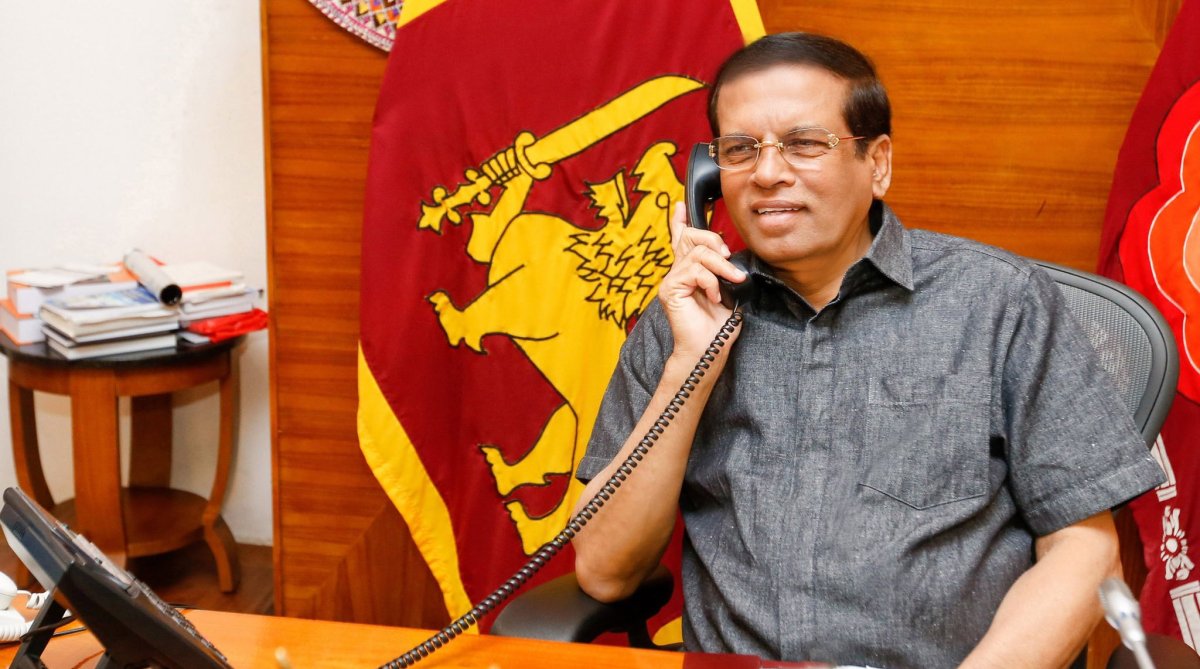Handloom fashion show at Bharat Tex 2025 attracts buyers from Europe, Australia
The event was organised at the amphitheatre in Bharat Mandapam as part of the Bharat Tex 2025 exhibition being held here from February 14-16.
Wickramasinghe, who has refused to accept his dismissal, argues that he cannot legally be removed until he loses the support of parliament.

Sri Lanka President Maithripala Sirisena (Photo: Twitter/@MaithripalaS)
Sri Lankan President Maithripala Sirisena has lifted the suspension of parliament and summoned a meeting of the legislature on Monday to end the current political stalemate in the country over the sudden sacking of prime minister Ranil Wickremesinghe, officials said Thursday.
Sirisena replaced Wickremesinghe with former president Mahinda Rajapaksa in a dramatic turn of events last Friday.
Advertisement
Sirisena also suspended Parliament until November 16, which experts said was meant to buy time to engineer crossovers from Wickremesinghe’s side to Rajapaksa in the 225 member parliament to reach the 113 majority mark.
Advertisement
He was under increasing political and diplomatic pressure to reconvene Parliament and resolve the crisis.
The Sri Lankan President Maithripala Sirisena has lifted the suspension of parliament and summoned a meeting of the legislature on Monday to end the current political stalemate in the country president has agreed to call a parliamentary session on November 5, officials at Rajapaksa’s office said.
Sirisena and parliament Speaker Karu Jayasuria discussed the issue yesterday. Sirisena later indicated that he may call the session next week.
Jayasuriya’s office, however, said that seat for the prime minister in the assembly would be reserved for Rajapaksa as the parliamentary officials are bound by the government gazette issued naming as the premier.
Sirisena swore in a new Cabinet under Rajapaksa on Monday despite a warning from the parliament speaker of possible violence if lawmakers were not summoned immediately to resolve the crisis.
Wickramasinghe, who has refused to accept his dismissal, argues that he cannot legally be removed until he loses the support of parliament.
He has called for a floor test to prove his majority in parliament.
Rajapaksa has so far managed to rope in five lawmakers from Wickramasinghe’s party to bolster his strength to 101. Despite the cross-overs, it was unclear if Rajapaksa has the 113 votes he requires to prove the majority. Prior to the crisis, Wickramasinghe’s United National Party (UNP) had the backing of 106 parliamentarians, and Rajapaksa had 95 legislators of the United Peoples’ Progressive Alliance (UPFA).
The Tamil National Alliance (TNA) has 16 seats in the house and the People’s Liberation Front (JVP) has six legislators.
On Tuesday, angry protests rocked Sri Lanka’s capital as thousands of demonstrators gathered for a rally organised by deposed prime minister Wickremesinghe’s party against what it said was a “coup” by President Sirisena.
Advertisement